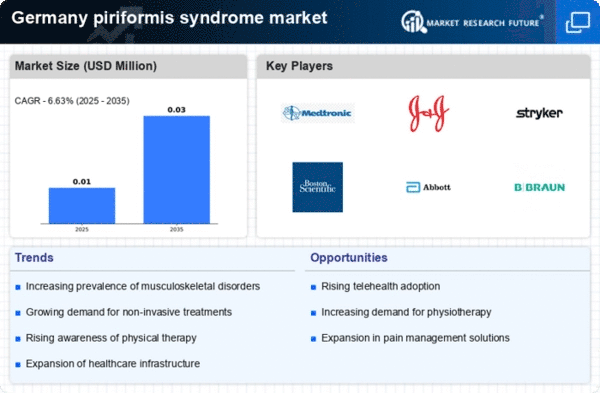Rising Healthcare Expenditure
The upward trend in healthcare expenditure in Germany is a notable driver for the piriformis syndrome market. As the government and private sectors invest more in healthcare services, patients are likely to have better access to diagnostic and therapeutic options for conditions like piriformis syndrome. Recent reports indicate that healthcare spending in Germany has increased by approximately 4% annually, reflecting a commitment to improving patient care. This rise in expenditure may facilitate the development and availability of advanced treatment modalities, thereby enhancing the overall market landscape. The piriformis syndrome market stands to gain from this trend, as increased funding can lead to improved healthcare infrastructure, better access to specialists, and a wider array of treatment options for patients suffering from this condition.
Growing Interest in Physical Therapy
The rising interest in physical therapy as a primary treatment modality for musculoskeletal conditions is a key driver for the piriformis syndrome market. In Germany, there is an increasing recognition of the benefits of non-invasive treatment options, such as physical therapy, which focuses on rehabilitation and pain management. This trend is supported by various studies indicating that physical therapy can effectively alleviate symptoms associated with piriformis syndrome. As healthcare providers emphasize conservative treatment approaches, the demand for physical therapy services is likely to grow. This shift towards non-invasive management strategies may lead to an expansion of the piriformis syndrome market, as more patients opt for physical therapy as a first-line treatment option, potentially reducing reliance on surgical interventions.
Advancements in Diagnostic Techniques
Technological advancements in diagnostic techniques are significantly influencing the piriformis syndrome market. Enhanced imaging modalities, such as MRI and ultrasound, allow for more accurate identification of piriformis syndrome, which may have previously been misdiagnosed. In Germany, the adoption of these advanced diagnostic tools has increased, leading to a more precise understanding of the condition's prevalence. This improvement in diagnosis is crucial, as it enables healthcare providers to offer targeted treatment options, thereby improving patient outcomes. The piriformis syndrome market is likely to benefit from this trend, as more patients receive appropriate diagnoses and subsequently seek effective management strategies for their symptoms. As diagnostic accuracy continues to improve, the market may see a corresponding rise in demand for therapeutic interventions.
Rising Incidence of Musculoskeletal Disorders
The increasing prevalence of musculoskeletal disorders in Germany is a notable driver for the piriformis syndrome market. As the population ages, the incidence of conditions such as piriformis syndrome is expected to rise. According to recent health statistics, approximately 20% of adults in Germany experience some form of musculoskeletal pain, which includes issues related to the piriformis muscle. This growing patient population necessitates enhanced diagnostic and therapeutic options, thereby propelling the demand for treatments specific to piriformis syndrome. The healthcare system's focus on addressing these disorders is likely to stimulate market growth, as more individuals seek effective management solutions for their pain and discomfort. Consequently, the piriformis syndrome market is poised to expand in response to this demographic shift and the associated healthcare needs.
Increased Investment in Pain Management Research
The growing investment in pain management research is a significant driver for the piriformis syndrome market. In Germany, both public and private sectors are allocating resources to explore innovative pain management solutions. This focus on research is crucial, as it aims to develop new therapies and improve existing treatment protocols for conditions like piriformis syndrome. The market is likely to benefit from these advancements, as novel approaches to pain relief may emerge, enhancing the quality of care for patients. Furthermore, increased funding for clinical trials and studies may lead to a better understanding of the underlying mechanisms of piriformis syndrome, ultimately resulting in more effective treatment options. As research progresses, the piriformis syndrome market may experience growth driven by the introduction of new therapies.
















